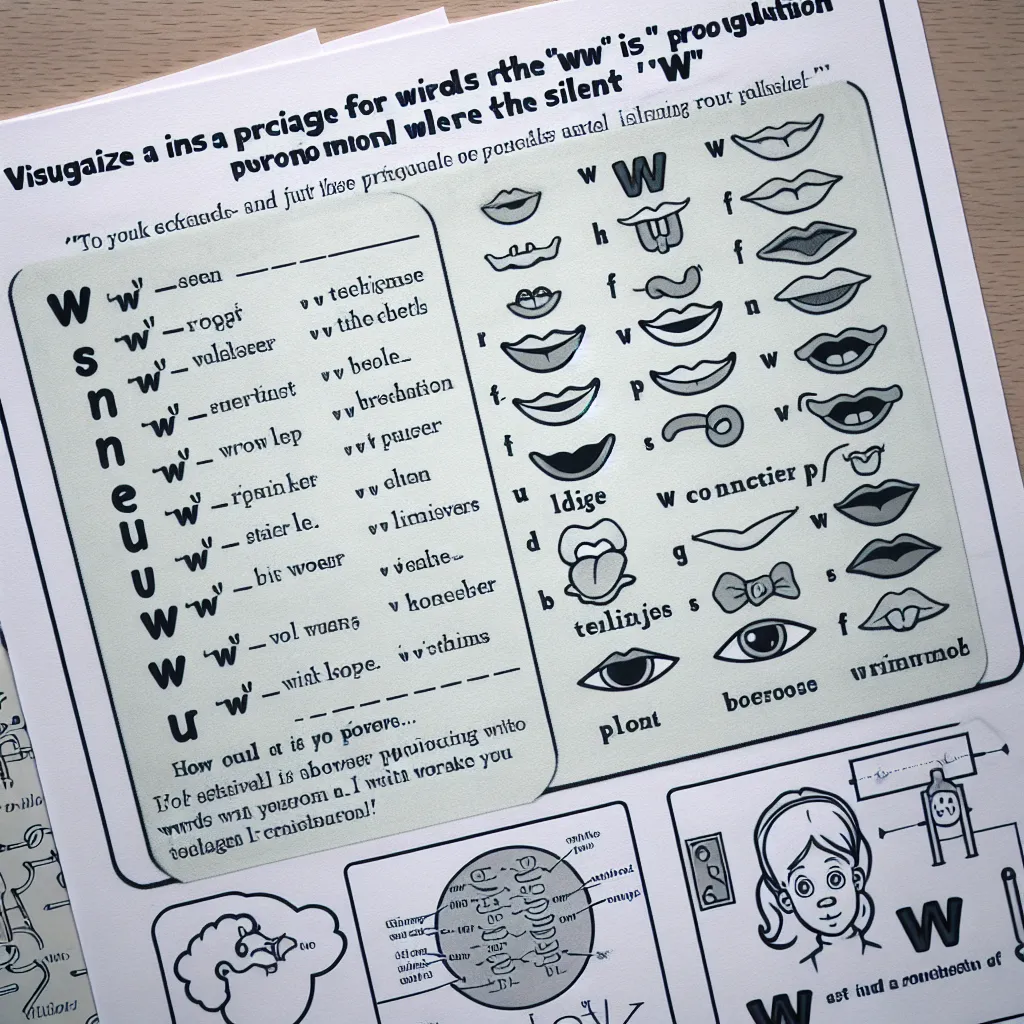English pronunciation can be tricky, especially when it comes to silent letters. One of the most challenging silent letters is the ‘w’. In this comprehensive guide, we’ll explore how to pronounce English words with silent ‘w’, providing you with valuable tips and examples to improve your pronunciation skills.
Understanding Silent ‘W’ in English
Silent ‘w’ is a common occurrence in English words, often appearing at the beginning of words or in certain letter combinations. Understanding when and why ‘w’ is silent can significantly enhance your pronunciation accuracy.
Common Patterns of Silent ‘W’
- Words beginning with ‘wr-‘
- Words with ‘-sw-‘ combinations
- Words ending in ‘-aw’
- Words with ‘wh-‘ at the beginning
 Silent W Patterns in English
Silent W Patterns in English
Let’s delve deeper into each of these patterns and explore some examples.
Words Beginning with ‘Wr-‘
In words starting with ‘wr-‘, the ‘w’ is always silent. This pattern is derived from Old English and is consistently applied in modern English pronunciation.
Examples:
- Write (pronounced as ‘rite’)
- Wrong (pronounced as ‘rong’)
- Wrap (pronounced as ‘rap’)
- Wreck (pronounced as ‘reck’)
- Wrist (pronounced as ‘rist’)
Words with ‘-sw-‘ Combinations
In some words containing the ‘-sw-‘ combination, especially before ‘or’, the ‘w’ is silent.
Examples:
- Sword (pronounced as ‘sord’)
- Answer (pronounced as ‘an-ser’)
Words Ending in ‘-aw’
In words ending with ‘-aw’, the ‘w’ is not pronounced as a separate sound but influences the pronunciation of the preceding vowel.
Examples:
- Law (pronounced as ‘lah’)
- Saw (pronounced as ‘sah’)
- Draw (pronounced as ‘drah’)
Words with ‘Wh-‘ at the Beginning
In many words starting with ‘wh-‘, the ‘w’ is silent, especially in British English. However, in some dialects, particularly in parts of Scotland and Ireland, the ‘w’ may be pronounced.
Examples:
- Who (pronounced as ‘hoo’)
- Whole (pronounced as ‘hole’)
- Whose (pronounced as ‘hooz’)
Common Pronunciation Mistakes with Silent ‘W’
Many English learners struggle with silent ‘w’ pronunciation. Here are some common mistakes to avoid:
- Pronouncing the ‘w’ in ‘write’ as ‘w-rite’
- Saying ‘sw-ord’ instead of ‘sord’ for ‘sword’
- Pronouncing ‘who’ as ‘w-hoo’ instead of ‘hoo’
To avoid these mistakes, practice listening to native speakers and focus on the correct pronunciation of words with silent ‘w’.
Tips for Mastering Silent ‘W’ Pronunciation
-
Listen and repeat: Use pronunciation resources and listen to native speakers to familiarize yourself with the correct pronunciation.
-
Practice with tongue twisters: Try tongue twisters like “Which witch wished which wicked wish?” to improve your ‘wh-‘ pronunciation.
-
Use phonetic transcriptions: Refer to phonetic transcriptions in dictionaries to understand the correct pronunciation.
-
Record yourself: Record your pronunciation and compare it with native speakers to identify areas for improvement.
-
Focus on word stress: Pay attention to word stress patterns, as they can affect the pronunciation of silent letters.
 Silent W Practice Exercises
Silent W Practice Exercises
Phonemic Chart and Commonly Mispronounced Words
Understanding the phonemic chart can greatly assist in mastering silent ‘w’ pronunciation. Here’s a list of 10 commonly mispronounced words with silent ‘w’:
- Write (/raɪt/)
- Wrangle (/ˈræŋɡəl/)
- Wrist (/rɪst/)
- Sword (/sɔːrd/)
- Answer (/ˈænsər/)
- Whole (/hoʊl/)
- Whoop (/huːp/)
- Wreath (/riːθ/)
- Wry (/raɪ/)
- Wrinkle (/ˈrɪŋkəl/)
Practice these words regularly, focusing on the correct pronunciation without the ‘w’ sound.
Conclusion
Mastering the pronunciation of English words with silent ‘w’ takes time and practice. By understanding the common patterns, avoiding typical mistakes, and following the tips provided in this guide, you can significantly improve your pronunciation skills. Remember, consistent practice and exposure to native English speakers are key to perfecting your pronunciation.
For more pronunciation tips, check out our guides on how to pronounce English words with silent vowels and how to pronounce English words with silent ‘l’. Keep practicing, and you’ll soon find yourself pronouncing words with silent ‘w’ like a native speaker!




